It has just gone 6.30am at Hurrah’s Casino on the legendary Las Vegas Strip and 60-year-old Bettie has completed a marathon four-hour session on the slot machines.
‘One hundred and sixty dollars down,’ she tells me, puffing on a cigarette and heading gingerly out into the 40-degree morning heat. On Las Vegas Boulevard, Bettie points towards the Mirage Hotel opposite, the strip’s first and most iconic mega-resort, which closed earlier this week after 35 years in operation.
‘You wanna know Vegas?’ she asks with a grin. ‘That was Vegas.’
Once the entertainment capital of the world – famous for its luxury hotels, high-end casinos, breathtaking shows and legendary musical residencies – Las Vegas has morphed into something altogether more downbeat and, as I discovered this week, sinister.
Visitor numbers are plummeting. The first quarter of 2025 saw a 6.9 per cent decrease in tourism on the same period last year, driven largely by a fall in international tourists. Remarkably, Americans now make up 88 per cent of all visits to Vegas. The number of British tourists has fallen by 25 per cent since a peak of almost three-quarters of a million in 2019.
Rip-off prices are partially to blame. Las Vegas made headlines earlier this year when it emerged that MGM’s Aria Hotel is selling 500ml bottles of water from the minibar for an unfathomable $26 (£19). Indeed, prices on the Strip have spiralled out of control in recent years with tourists telling the Mail of spending $15 (£11) on a fruit juice, $20 (£15) on coffee and a croissant and $18.25 (£14) on a small can of Bud Light beer.
‘I would say these are New York prices, but they’re not,’ says 33-year-old investment banker Victor. ‘They’re even more expensive. I had a steak with a friend at a chain restaurant in the Cosmopolitan and one course set us back $300. It’s the tips that get you, with up 25 per cent of the bill the norm in some places.’ He adds with a wry smile: ‘Maybe I’m in the wrong profession.’
But prices are only part of the problem. The city’s opioid crisis has become so bad – especially among the homeless – that one leading rehabilitation charity has been paid by certain casinos to forcibly detain and remove those lingering around their premises and haranguing paying guests.
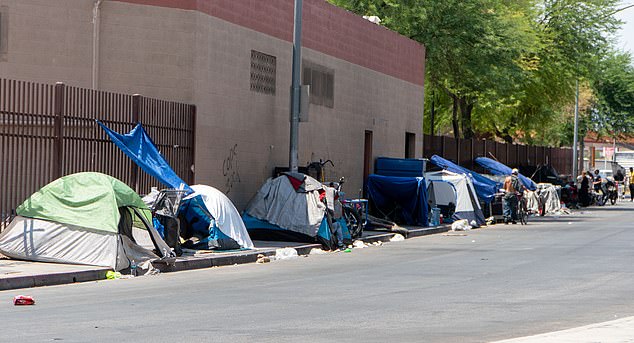
Homelessness in Las Vegas has exploded, with a conservative estimate of around 8,000 people unhoused across a city of just over half a million
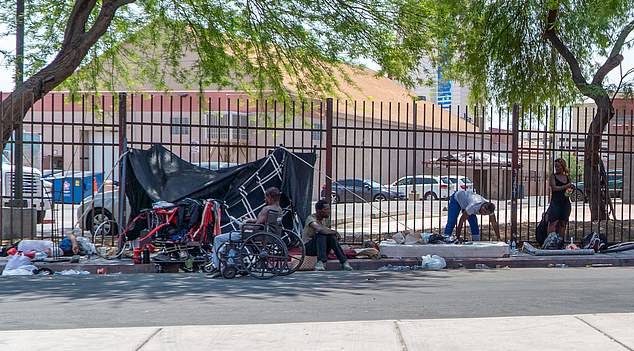
Walk along the busy Las Vegas Boulevard at any time of day and you will see people clearly homeless and often under the influence of drugs, writes Kelly
Meanwhile, the proliferation of online gambling and indeed the emergence of other entertainment hubs – notably parts of the Middle East such as Dubai and Riyadh – have taken the shine off Sin City.
While once Vegas was also the boxing capital of the world and the place to see Mike Tyson in his prime, today’s heavyweights are shunning it for the riches of Saudi Arabia. British champion Anthony Joshua, for example, fought two of his last three bouts at the Kingdom Arena in Riyadh.
And so, with skyrocketing prices, global sport stars and musicians choosing to perform elsewhere, casinos ditching live games for electronic betting terminals and a drugs crisis ravaging the city, Las Vegas is on the ropes. The question is: can it recover?
‘We used to be considered Sin City,’ agrees David Marlon, founder of the hugely successful rehab clinic Vegas Stronger. ‘Glitz, glamour, the place you go to for the best DJs, the best nightclubs, the best gambling, the best resorts… But today, you know there’s gonna be panhandling, vagrancy, the smell of weed… and it’s gonna be kind of dirty.’
Homelessness in Las Vegas has exploded, with a conservative estimate of around 8,000 people unhoused across a city of just over half a million. That’s more homeless people than in London, a city almost 16 times as populous.
However, according to Marlon – who entered the charity sector after two decades working in insurance, during which time he developed and recovered from his own cocaine addiction – homelessness is not the real issue.
‘It’s really an addiction epidemic,’ he tells me from his office, a short flight of stairs from the clinic’s medical rooms, yoga studio, boxing gym and therapy centre. ‘Some 94 per cent of the homeless people who walk through our door have a diagnosed substance-use disorder. And it’s three things: alcohol, opioids and amphetamines.’
Indeed, walk along the busy Las Vegas Boulevard at any time of day and you will see people clearly homeless and often under the influence of drugs.
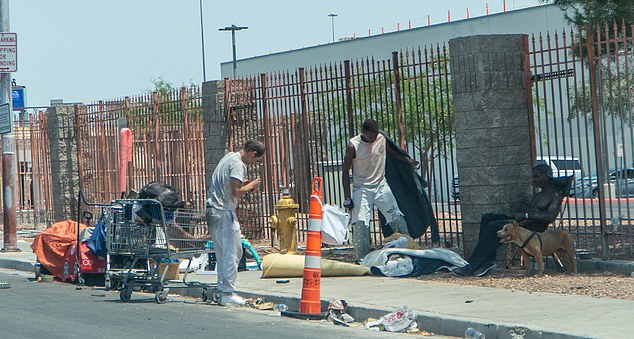
Perhaps most alarming are the hundreds of people passed out in the searing heat – which topped 46 degrees this week
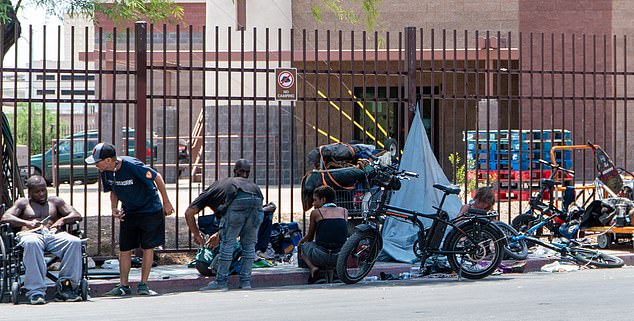
According to Kelly, Las Vegas is a city ‘plagued by drugs and homelessness’ and is ‘seemingly caught in a death spiral’
One morning I saw a man washing his clothes in a fountain beside Caesar’s Palace, hanging them to dry on the hotel fencing.
Another – who can’t have been more than 40 – was stopped by security walking between blackjack tables in Caesar’s Palace. His arm was in a cast, while his jeans were ripped and riding down towards his knees. In one hand he carried a bottle of unidentified contents while the other arm hung limp by his side, his face expressionless, his eyes vacant.
Perhaps most alarming, however, are the hundreds of people I saw each day, passed out in the searing heat – which topped 46 degrees this week – their skin burnt and peeled, a ghastly tricolour of black, red and pink.
‘We lost 520 to heat-related death last summer,’ David admits, grimly. His downtown rehab facility is just a stone’s throw from a number of improvised roadside encampments where the city’s homeless have erected shelters out of old tarpaulin and umbrellas.
‘And we’re going to lose more this summer… nobody should be living on the streets here in the Mojave Desert.’
But while David’s ‘calling’ is the well-being of the addicts he helps, the casinos are more interested in protecting the welfare of their paying customers – or at least their wallets.
‘Kenny Epstein,’ David begins with a smile. ‘He runs the El Cortez hotel on the Strip. He said, ‘Dave, my high-rollers are telling me that their wives are saying they can’t come down here any more because they’re getting harassed in the street when they leave!’
‘So, I had my outreach team walk around his casino three times a day, and we kind of scoop up anybody homeless and put them in the van. It’s what I call a ‘compassionate assertive intervention’. Because there’s no real conversation to be had with a guy who’s actively psychotic on methamphetamines.’
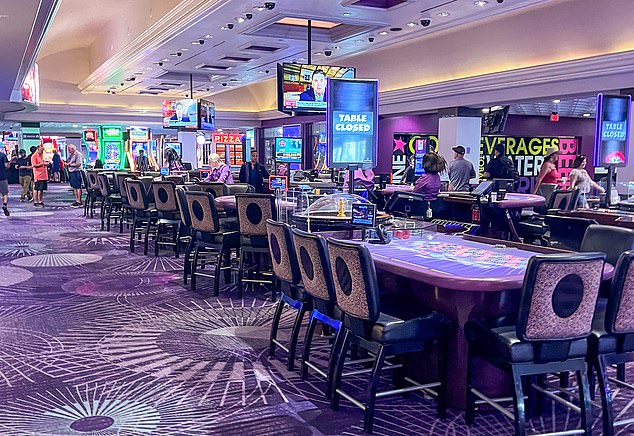
Despite falling visitor numbers, resort casinos continue to post large profits
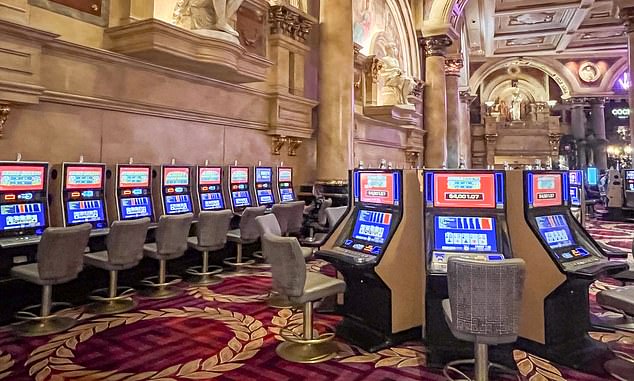
Prices on the Strip have spiralled out of control in recent years with tourists telling the Mail of spending $15 (£11) on a fruit juice, $20 (£15) on coffee and a croissant and $18.25 (£14) on a small can of Bud Light beer
‘Vegas is a billion-dollar brand,’ David concludes, showing me a number of over-sized cheques from hotels including El Cortez, The Venetian and The Mirage. ‘And the casinos recognise that these 8,000 unhoused are tarnishing our brand.’
And yet, when it comes to the Las Vegas ‘brand’, it is rising prices that seem – above all else – to be leaving a sour taste in tourists’ mouths.
Of course, prices are high across America, not just in Vegas. In fact, the cost of living Stateside is more than 15 per cent higher than in the UK. However, the Vegas Strip stands head and shoulders above most other parts of the country.
‘Even in some of the more local establishments, prices recently have jumped up 25, 30 per cent,’ local writer and Vegas expert Sam Novak tells the Mail. ‘It’s no longer affordable to do the simplest of things. From a simple dinner to a night out with cocktails for your friends, it’s prohibitive. It has already damaged the appeal of Vegas.’
The cost of accommodation, too, is a factor.
Once a famous value destination, the average hotel stay in Vegas in January of this year cost $208 (£155) per night. That’s up from $171 (£127) in 2022.
And these numbers do not include the astronomic ‘resort fees’ – supposedly to pay for facilities such as swimming pools and gyms – which became commonplace a decade ago and are added to bills regardless of whether one uses the facilities or not. For prestige hotels such as the Four Seasons, Encore, Caesar’s Palace and The Bellagio, the additional cost is more than $60 (£45) per night.
On top of this, the vast majority of hotels charge an average of $25 (£19) a day for parking, adding another $100 onto the already bloated cost of a long weekend. Other hidden costs include room service delivery fees. At The Bellagio – famed for its lavish fountain display – having food served in your room costs $25 before you’ve even chosen what you want from the menu.
The days when casinos gave out free steak, lobster and cocktails to keep their guests gambling are long gone. This is now a town where nothing comes for free.
‘It is expensive. We paid $33 for a burger at the Excalibur hotel. And over $7 for a bottle of Gatorade,’ admits 23-year-old Hugo, who has been visiting Vegas with three pals on a road trip around the West. ‘It’s a strange mix here of happiness and sadness, you see people having a good time, smiling, taking photos right next to homeless people or people losing money at a casino first thing in the morning.’
Despite falling visitor numbers, resort casinos continue to post large profits. ‘The economics may reflect that tourists are spending more,’ Sam Novak concludes, ‘but they may be enjoying themselves less, which ultimately is not a self-sustaining model.’
While hotels are commanding larger fees and taking more on the casino floor, they’re also providing fewer services.
‘MGM laid off their entire concierge department, saying people prefer apps. I don’t know if that’s true. Maybe they do,’ reveals local economics analyst Steven Campbell. ‘There’s no bell desk service at the Excalibur now. You have to bring your own luggage up to the rooms.’
At the same time, resorts are increasingly offering self-service check-ins on an iPad, casinos are ditching traditional table games such as roulette and blackjack for digital equivalents at an electronic betting terminal and – in some extreme cases – even using robotic arms to serve food, such as at a cookie stall in Caesars’s Palace or the Tipsy Robot bar off the Strip.
‘I just think that people feel the value isn’t there for the dollars and cents they pay,’ says Campbell. ‘It’s now a dollar-first, experience-second city.’
When it comes to musical acts, it’s a similarly depressing story.
Claudio and Ivan from Brazil love coming to Vegas for the residencies the city is famous for. Speaking to them beneath the famous ‘Welcome to Fabulous Las Vegas’ sign, they admitted spending more than $1,600 (£1,190) on tickets to see Lady Gaga and the Backstreet Boys this week. Similarly, R’n’B star Bruno Mars – playing at the Park MGM – is charging more than $500 a ticket, making him the most expensive artist in the world to see live.
But when it comes to music, the price point is not the only pinch.
Far from the heady days of Frank Sinatra and Liberace to Elvis Presley and Elton John, today the city’s reputation has been shattered by a string of underwhelming performers on top of absurd ticket prices.
‘I’m really concerned so many high-profile artists have created a negative experience for people when they come here,’ continues Sam Novak, referencing Kelly Clarkson, who has just opened her show at the Colosseum inside Caesar’s Palace.
Clarkson cancelled two of her opening performances minutes before the curtain was set to rise, justifying herself to disappointed fans by claiming on social media: ‘The prep and rehearsals have taken a toll on my voice.’
When she did finally go on, many were still left disappointed. Far from the glitz and glamour of old-school Vegas, Clarkson’s set resembles an ‘intimate recording studio’ with warm lighting, oak panels and pictures on the walls. Clarkson – who wears black jeans and a T-shirt for the gig – described the set as ‘chic and comfortable’. So not exactly Liberace, then.
‘You come to Vegas for bright lights, sequins and razzmatazz,’ 58-year-old Colin from west London tells the Mail after the show. ‘Instead, it felt like Kelly at the kitchen table.’
In spite of everything, there is still hope for Vegas. The recently shuttered Mirage has been bought by Hard Rock, a hospitality brand, which is set to turn it into a ‘700ft guitar-shaped hotel’.
Meanwhile, the opening of The Sphere – the remarkable performance venue coated entirely with LED screens – has made Vegas an entertainment trailblazer again, with a profile even those big-spending Saudis must envy.
‘I went to the opening of Backstreet Boys show at The Sphere on Saturday night,’ says Sam Novak. ‘And it was an incredible experience. You realise when you’re in there with 20,000 people that this is something you cannot get anywhere else.’
But bright lights, showgirls, roulette wheels and top singers are disappearing.
This is now a city with more billboards for injury lawyers than for anything else. A city where the casinos are sterile, dingy places crammed full of fixed-odds betting terminals. A city where the burlesque shows are half-empty and the musicians charge hundreds of dollars for a ticket. A city plagued by drugs and homelessness. A city seemingly caught in a death spiral.
A city not so much sinking into the Nevada sand as melting into the tarmac.











